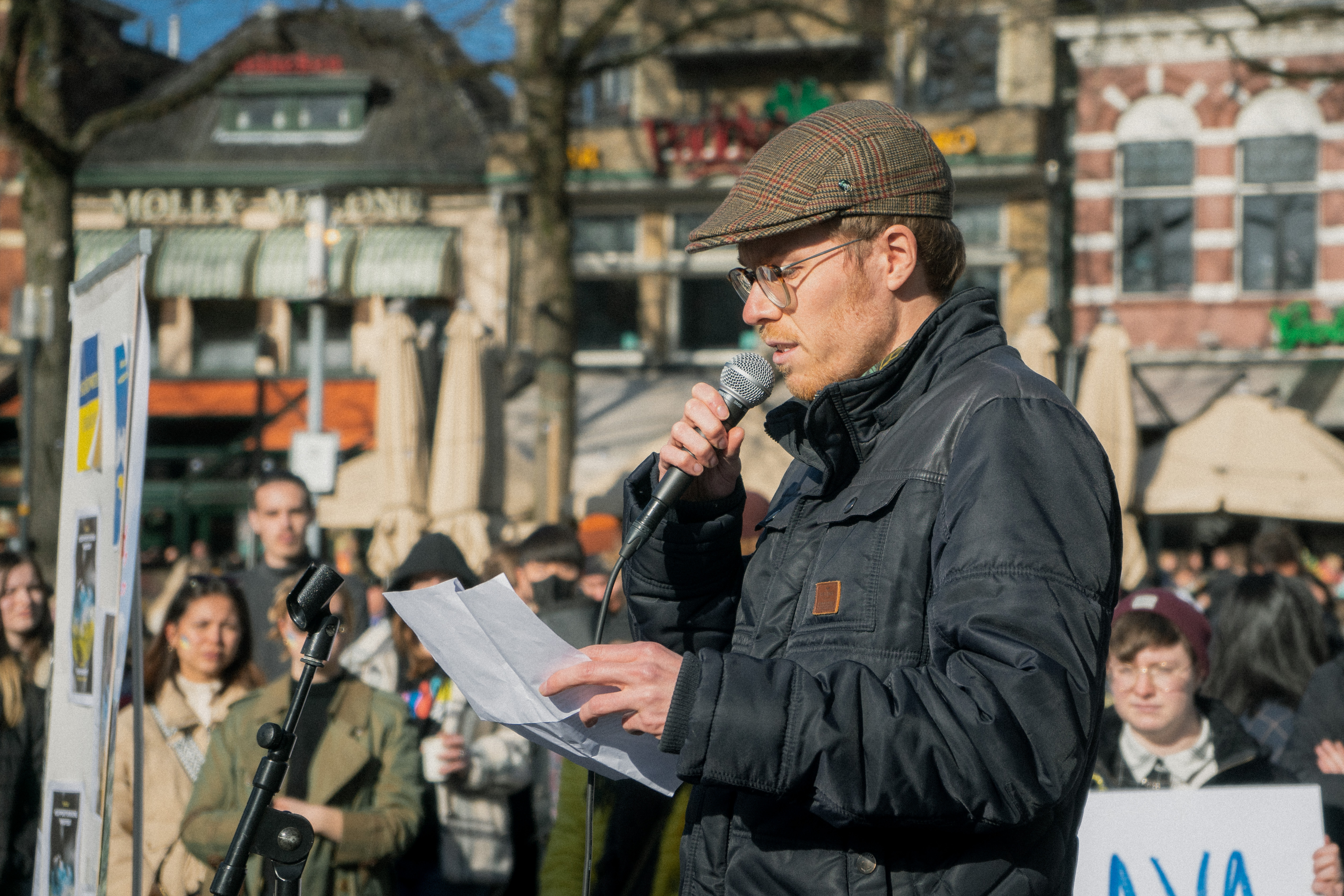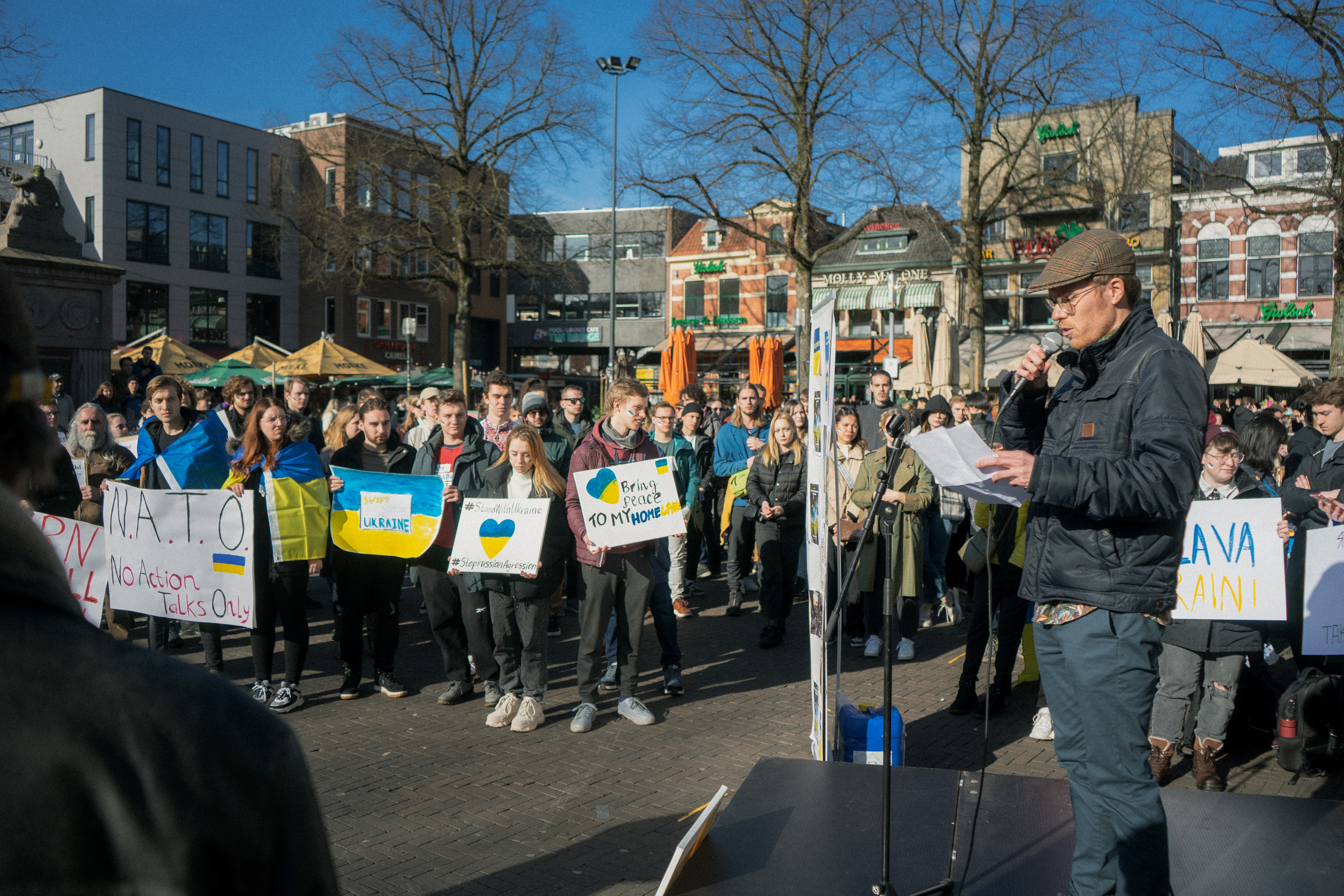Paragraphs
– Happy Europe Day
– Freedom doesn't come for free
– Europe in Enschede and the EUREGIO
– The European digital way
Happy Europe Day!
These days I'm happy to say I'm a Tukker. I will also always keep presenting myself as a Brabander. And for 29 years and counting, I'm internalising the history of the Netherlands and as a Dutch product of merchants and pastors, activists and philosophers: I'm also a Dutchmen.
But over the last years, I have been meeting students from all over the world at my University of Twente: People from Aruba, Germany, Algeria, Iran, Vietnam, Pakistan, Barcelona, Russia, Singapore, Turkey, Brasil, India, Kenia, China, Ethiopia, Oman, Greece, Ghana, and probably more. I have (or had) the pleasure of calling many of you my friends, and your courage of travelling across the world to study in Enschede inspired me not only with your courage, but also with the culture you brought to my life and to the university in general.
Especially since I've joined Volt Europa and discovered Interrailing, I've been travelling around Europe more and more, to meet people from Lisbon to Prague, from Bologna to Maglaj, from Sarajevo to Strasbourg, from Brasilia to Georgia, and from Damascus to Kyiv. I'm very sure I will continue these travels for many more years to come.
Through these experiences I have become a xenophile. I have become genuinely interested in anything new and 'other' than what I already know, eager to learn about everyone and everything who brings their own culture, their own history, their own dreams about what could be improved. Everyone I have met unveils a new perspective on the world by just talking about their life, their culture and their language.
I'm very happy to be a European as well. I think humans, like all of nature, can thrive in diversity, and I feel connected more than ever.
I know that European values and ideas are shared far and wide beyond Europe. I sometimes feel that keeping at the European level geographically excludes others who shared the same ideals, but it also feels a bit weird to call myself a citizen of the world. The world of democracy and rule of law? I liked how Rob Riemen introduced what it meant to become a member of the Nexus Institute: by becoming a member of the Nexus Institute, you become a citizen of the republic of ideas, and once you're in, you stay a citizen of that republic of ideas for the rest of your life.
I hope that the European way is open for anyone who enjoys wandering around in the republic of ideas, and who shares fundamental European values as democracy, human dignity and solidarity.
Freedom doesn't come for free
Last summer in Sarajevo, I learned from a tour guide about the siege of Sarajevo from 1992 to 1996. I have to confess, before this tour I was one of the people saying that we had peace in Europe since the second world war. The European Union may have had peace, but we didn't share our peace with our direct neighbours. I learned about Srebrenica, which was very, very shocking to dive into for a whole day. It must be a terrible feeling when you think you are safe, the feeling you are protected by someone else, is violated. In Sarajevo I also met two Ukrainian women. They came partly for holiday, but with a very conscious choice for a city that is still recovering after a war that happened 30 years ago. Talking about war and peace with them, and later also with Ukrainian students and empmloyees of the University of Twente and Mykhaylo Pobigay, the president of Volt Ukraine, has changed the distance I feel to war, and the importance I feel to doing something that actually matters, which includes protecting your freedom and your values.
With Europe in military conflict yet again in Ukraine, it tells me that we cannot keep trusting stability and relationships with autocrats and non-democratic regimes. We should not be dependent om them. Because in the long run, power always corrupts and then we have been the ones financing their war-machine based on the short-term hope for stability.
I'm very happy that Finland joined NATO, and I think in these times it is essential to realise that freedom does not come for free. In a world of conflict and very different values and ideas about how to govern a state, we can strive to co-exist with others, but I'm convinced that the coalition of democratic nations should be able to defend their values not only with soft power and democracy, but also with hard power. This means for me that, aside from the duty of passing culture and history, art, literature, music and all other stories to the next generations, we must also realise that we live in a world where not everyone values freedom and equality, and that it is naive to think that we can always talk our way out of conflict. Sometimes, being able to physically defend yourself and your country is the thing you have to resort to, and therefore I am more and more appreciating the value of defence and having a strong army that can do exactly that: defend. I will need to think longer about how & when to intervene outside of your official alliances, because the war in Ukraine shows that this is a complex geopolitical process. I do think that it is important for us to show that you don't aim to be, in any way, the agressor that initiates a conflict. Doing that properly will distinguish ourselves from other major powers in the world. We have to be consistent with our intentions for peace. For Russia, we can learn about their intentions not only from Ukraine, but also from what they did in other countries like Georgia. For the US, we can learn from what they did in Vietnam and more recently Irak and Afghanistan. For China, we can learn from what they did in Hong Kong, and we can learn about what they are currently doing with Taiwan.
Freedom does not come for free, but it is very well worth to protect.
Europe in Enschede and the EUREGIO
As a council member in Enschede, I'm very much connecting to our partner city Münster, through being the Euregiorat of the EUREGIO and through building up strong and lasting connections with Volt Münster, colleagues and friends from the same European party in the same region, but divided by the border as a scar of the past.
This year Westphalia celebrates 375 years of Westphalian Peace, with a lot of events happening in Münster and Osnabrück.
The Westphalian Peace Treaty was the first time in European history that we ended war with a peace treaty.
This afternoon on Europe day, I had the honour of running with a group that brough the peacefire from Enschede to Gronau. I agree with the authors of the article: It is historical that we bring the peacefire, a symbol of freedom, peace and democracy, from the Netherlands to Germany. This way, we connect the peace after the Second World War to the Westphalian Peace, so that we can together learn from history to achive peace, now and in the future.
The European Digital way
I also want to use this already quite long blog post to talk about digitalisation. Of course ;–)
For this Europe Day, I want to say some words about the European way. But first some words about the 'other' way:
Let's stop hyping Artificial Intelligence. Yes, machines can help us to recognise patterns. It's not much more than that. Yesterday, Naomi Klein wrote this wonderful article: “Tech CEOs want us to believe that generative AI will benefit humanity. They are kidding themselves”. At the same time this piece was published about the death of the metaverse.
I don't want to waste much words on this. This is not the way forward, so I hope we will all realise that we don't want to be the product and face all the negative consequences of the dark patterns in the designs, and people farming fundaments that these systems are built upon.
Now about European way.
Today, Tagesschau joined mastodon. That is awesome!
Yesterday, a map of a European federation of regions went viral. Also very cool!
2 weeks ago, there was this fantastic press release about European soft power, where Europe will finally start regulating Big Tech. AMAZING!
We all need to internalise that the European way is not the American way. I don't care about the next unicorn. I believe the European way is building a Shared European Digital Public Sphere, just like the cafés Georg Steiner saw as the essence of Europe.
Let's start shaping the future by imagining a range of possible futures and reading about aspects of these possible futures that we actually want! I'm very much looking forward to the Public Spaces conference 2023, full of people who do exactly that.
Let's shape our future based on public values.
Future. Made in Europe!


